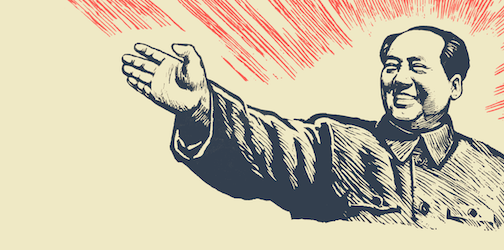

Mao Zedong (毛泽东)(1893-1976)[Mao-family name; Zedong-given name, once written as “Tse-tung”]. Known as “Chairman Mao,” he was a Chinese politician, Marxist theorist, military strategist, poet, and revolutionary who was the founder of the People’s Republic of China (PRC). He led the country from its establishment in 1949 until his death in 1976, while also serving as the chairman of the Chinese Communist Party during that time. His theories, military strategies and policies are known as Maoism.
Mao was the son of a prosperous peasant in Hunan. He supported Chinese nationalism and had an anti-imperialist outlook early in his life, and was particularly influenced by the events of the Xinhai Revolution of 1911 that ended China’s last imperial dynasty, the Qing dynasty as well as the May Fourth Movement an anti-imperialist political movement which grew out of student protests in Beijing on May 4, 1919.
Students gathered in front of Tiananmen to protest the Chinese government’s weak response to the Treaty of Versailles decision to allow the Empire of Japan to retain territories in Shandong that had been surrendered by the German Empire after the Siege of Tsingtao in 1914.
Mao later adopted Marxism-Leninism while working at Peking University as a librarian. He became a founding member of the Chinese Communist Party (CCP), leading the Autumn Harvest Uprising in 1927.
During the Chinese Civil War between the Kuomintang (KMT) and the CCP, Mao helped to found the Chinese Red Army, led the Jiangxi Soviet’s radical land reform policies, and ultimately became head of the CCP during the Long March.
Although the CCP temporarily allied with the KMT under the Second United Front during the Second Sino-Japanese War (1937–1945), China’s civil war resumed after Japan’s surrender. Mao’s forces defeated the Nationalist government, which withdrew to Taiwan in 1949.
On October 1, 1949, Mao proclaimed the foundation of the PRC, a Marxist-Leninist single-party state controlled by the CCP. In the following years he solidified his control through the land reform campaign against landlords, the Campaign to Suppress Counterrevolutionaries, the “Three-anti and Five-anti Campaigns”, and through a truce in the Korean War, which altogether resulted in the deaths of several million Chinese.
For purposes of historical understanding, there seem to be two eras of Mao’s leadership: the Revolutionary (1919-49), and the Post-Revolutionary (1950-76). In the first three decades, he helped liberate the Mainland from European and Asian enemies. In the almost three decades that followed, he focused on “enemies within,” policies responsible for the lives of untold millions. It is possible to admire the first half of his leadership and condemn his second. Reasons for his change in leadership style are many and may include dementia and isolation.
From 1953 to 1958, Mao played an important role in enforcing command economy in China, constructing the first Constitution of the PRC, launching an industrialization program, and initiating military projects such as the “Two Bombs, One Satellite” project and Project 523. His foreign policies during this time were dominated by the Sino-Soviet split which drove a wedge between China and the Soviet Union.
In 1955, Mao launched the Sufan movement, the “Campaign to Eradicate Hidden Counterrevolutionaries,”, and in 1957 he launched the Anti-Rightist Campaign, in which at least 550,000 people, mostly intellectuals and dissidents, were persecuted. In 1958, he launched the Great Leap Forward that aimed to rapidly transform China’s economy from agrarian to industrial, which led to the Great Chinese Famine and the deaths of 15-55 million people between 1958 and 1962.
In 1963, Mao launched the Socialist Education Movement, and in 1966 he initiated the Cultural Revolution, a program to remove “counter-revolutionary” elements in Chinese society which lasted ten years and was marked by violent class struggle, widespread destruction of cultural artifacts, and an unprecedented elevation of Mao’s cult of personality. Tens of millions of people were persecuted during the Revolution, while the estimated number of deaths ranges from hundreds of thousands to millions.
After years of ill health, Mao suffered a series of heart attacks in 1976 and died at the age of 82. During the Mao era, China’s population grew from around 550 million to over 900 million while the government did not strictly enforce its family planning policy. During his leadership tenure, China was heavily involved with other Asian communist conflicts such as the Korean War, the Vietnam War, and the Cambodian Civil War.
Mao is considered one of the most influential figures of the 20th century. Mao’s policies were responsible for a vast number of deaths, with estimates ranging from 40 to 80 million victims due to starvation, persecution, prison labor, and mass executions, and his government has been described as totalitarian. He has been also credited with transforming China from a semi-colony to a leading world power by advancing literacy, women’s rights, basic healthcare, primary education, and improving life expectancy.
Mao is revered as a national hero who liberated the country from foreign occupation and exploitation in China. He became an ideological figurehead and a prominent influence over the international communist movement, being endowed with remembrance, admiration, and a cult of personality both during and after his life.